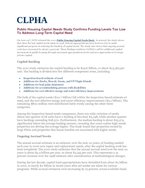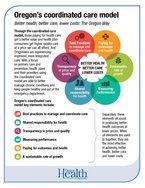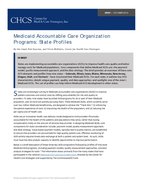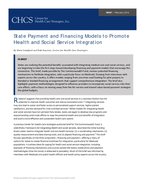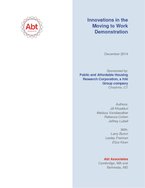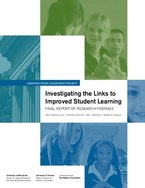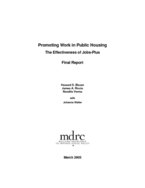Found 31 resources.
0
0
0
This report focuses on the homelessness and health care use of older homeless adults in New York City, specifically those 55 years of age or older. Recent evidence suggests a unique cohort effect of postWorld War II “baby boomers” born between 1955 and 1965 who have shown a disproportionately high
risk of homelessness over the last two decades.
Topics: Cost effectiveness, East Coast, Health, Homelessness, Housing, Low-income, Research, Seniors
 Shared by Housing Is
on Apr 11, 2019
Shared by Housing Is
on Apr 11, 2019 0
0
0
This report is intended to accompany a report entitled The Emerging Crisis of Aged Homelessness: Could Proposed Housing Solutions Be Funded from Avoidance of Excess Hospital and Nursing Home Costs?, which reports on findings from a multi-site study involving the analysis of data from Boston, Los Angeles and New York City. That report is motivated by recent evidence documenting a cohort effect in the single adult homeless population, wherein persons born between 1955 and 1964 have faced a disproportionate risk of homelessness over the past two decades.
Topics: Cost effectiveness, East Coast, Health, Homelessness, Housing, Low-income, Research, Seniors
 Shared by Housing Is
on Apr 11, 2019
Shared by Housing Is
on Apr 11, 2019 0
0
0
Could Housing Solutions be Funded by Avoidance of Excess Shelter, Hospital, and Nursing Home Costs?
Topics: Cost effectiveness, Health, Homelessness, Housing, Legislation & Policy, Research, Seniors
 Shared by Housing Is
on Apr 11, 2019
Shared by Housing Is
on Apr 11, 2019 0
0
0
The Home Preservation Initiative (HPI) for Healthy Living seeks to improve asthma outcomes related to unhealthy housing in five neighborhoods in West Philadelphia. By combining home repairs and community health worker home visits, HPI aims to significantly reduce emergency department visits and hospitalizations due to pediatric asthma. For these primarily African-American communities, substandard housing, unemployment, low wages and a lack of education are barriers to the overall health and well-being of residents. Using outcome data, the collaboration will show health care cost savings,...
Topics: Asthma, Cost effectiveness, Data sharing, East Coast, Health, Low-income, Medicaid / Medicare, Partnerships, Racial inequalities, Research
 Shared by Housing Is
on Mar 19, 2019
Shared by Housing Is
on Mar 19, 2019 0
0
0
Investments in affordable housing are a proven catalyst for economic growth, job creation, and development.
Topics: Cost effectiveness, Housing, Partnerships, Research
0
0
0
Stricter work requirement policies for the Supplemental Nutrition Assistance Program (SNAP) at the federal level were left out of the recently passed farm bill, but state policymakers are still considering whether to expand or establish their own work requirements for SNAP and Medicaid, with the goal of incentivizing employment. There’s no question that good jobs help spur upward mobility. But if we are serious about helping people work, we have to get serious about helping people improve their skills.
Topics: Child welfare, Cost effectiveness, Dual-generation, Early childhood, Food insecurity, Legislation & Policy, Low-income, Research, Stability, Workforce development
0
0
0
The Enhanced Transitional Jobs Demonstration (ETJD), funded by the Employment and Training Administration of the U.S. Department of Labor, tested seven transitional jobs programs that targeted people recently released from prison or low-income parents who had fallen behind in child support payments.
Topics: Asset building, Cost effectiveness, Criminal justice, Legislation & Policy, Low-income, Research, Stability, Workforce development, Youth
0
0
0
CLPHA’s Housing Is Initiative is engaged in a number of cross-sector activities focused on developing partnerships, facilitating a community of practice, resource development, promoting best practices, online collaboration, policy and advocacy, and training and education. Read about recent activities in this Fall Update.
Topics: Child welfare, CLPHA, Community development, Cost effectiveness, Data sharing, Early childhood, Education, Family engagement, Funding, Health, Homelessness, Housing, Low-income, Medicaid / Medicare, Mental health, Partnerships, Place-based, Post-secondary, Research, Stability, Substance abuse, Workforce development, Youth
0
0
0
The Colorado Coalition for the Homeless created the Denver Housing First Collaborative (DHFC) in 2003 with funding provided by a collaboration of federal agencies. The DHFC involved CCH as the lead agency, Denver Department of Human Services (DDHS), Denver Health (DHHA), Arapahoe House, the Mental Health Center of Denver (MHCD) and the Denver VA Medical Center. The DHFC is designed to provide comprehensive housing and supportive services to chronically homeless individuals with disabilities. Initial federal funding created the capacity to house and serve 100 chronically homeless individuals...
Topics: Cost effectiveness, Funding, Health, Homelessness, Housing, Pacific Northwest, Partnerships, Research, Stability, Supportive housing
 Shared by Housing Is
on Aug 9, 2018
Shared by Housing Is
on Aug 9, 2018 0
0
0

Through the hard work of communities around the country, we now have proof of something that we didn’t before—that ending homelessness is achievable. Home, Together builds upon what we have learned from states and communities over time, and lays out the strategies we know we must advance at the federal level in order to support and accelerate state and local progress.
Topics: Cost effectiveness, Data sharing, Disabilities, Dual-generation, Homelessness, Housing, Legislation & Policy, Low-income, Mental health, Partnerships, Preventative care, Racial inequalities, Stability, Substance abuse, Supportive housing
 Shared by Housing Is
on Aug 7, 2018
Shared by Housing Is
on Aug 7, 2018 0
0
0
Anthem’s affiliated health plans and other managed care organizations (MCOs) increasingly are helping Medicaid members who are diagnosed with mental health conditions and substance use disorders (MH/SUD) find stable housing, secure meaningful employment, and address a range of financial and daily life challenges.
Topics: Affordable Care Act, Cost effectiveness, Depression, Funding, Health, Housing, Medicaid / Medicare, Mental health, Nutrition, Substance abuse, Supportive housing, Workforce development
 Shared by Housing Is
on Jul 27, 2018
Shared by Housing Is
on Jul 27, 2018 0
0
0
Public Housing Capital Needs Study Confirms Funding Levels Too Low to Address Long-Term Capital Need
On June 24th, HUD released the 2010 Public Housing Capital Needs Study. In general, the study shows that since the last capital needs study in 1998, federal appropriations have been too low to make significant progress at reducing the backlog of capital needs. The study also shows that ongoing accrual costs have increased by about 15 percent. These findings reinforce CLPHA’s call for additional capital investment in public housing through increased appropriations levels and new approaches to leverage private capital.
Topics: Cost effectiveness, Disabilities, Energy, Funding, Lead, RAD, Research
 Shared by Housing Is
on Jul 27, 2018
Shared by Housing Is
on Jul 27, 2018 0
0
0
SAHF members believe that connecting residents of affordable housing with needed supports – such as educational resources or health services – can help vulnerable families and seniors achieve
a better quality of life. SAHF began the Outcomes Initiative to create a common framework for its members to demonstrate with data the impact on residents of providing housing-based services and support in the five key areas listed below.
Topics: Asset building, Cost effectiveness, Dual-generation, Education, Exercise, Food insecurity, Health, Housing, Mental health, Metrics, Nutrition, Safety, Stability
 Shared by Housing Is
on Jul 26, 2018
Shared by Housing Is
on Jul 26, 2018 0
0
0
Through the coordinated care model, those paying for health care get a better value and health plan consumers get higher quality care at a price we can all afford. And Oregonians are experiencing improved, more integrated care. With a focus on primary care and prevention, health plans and their providers using the coordinated care model are able to better manage chronic conditions and keep people healthy and out of the emergency department.
Topics: Cost effectiveness, Data sharing, Health, Metrics, Partnerships
 Shared by Housing Is
on Jul 24, 2018
Shared by Housing Is
on Jul 24, 2018 0
0
0
Part of New York State’s Homelessness Action Plan includes an investment of new supportive housing resources and services over the next five years to address vulnerable populations experiencing homelessness. Therefore, the availability of and access to various support services such as employment and training opportunities, parenting, counseling, independent living skills training, primary healthcare, substance disorder treatment and mental health care, child care, and benefits advocacy are critical components of any project funded under this plan.
Topics: Cost effectiveness, Criminal justice, Disabilities, Domestic violence, Foster care, Funding, Homelessness, Housing, Medicaid / Medicare, Mental health, Substance abuse, Supportive housing, Youth
 Shared by Housing Is
on Jul 23, 2018
Shared by Housing Is
on Jul 23, 2018 0
0
0
States are implementing accountable care organizations (ACOs) to
improve health care quality and better manage costs for Medicaid populations. Core components that define Medicaid ACOs are: the payment model; quality measurement approach; and the data
strategy. This brief provides an overview of these core ACO elements and profiles how nine states -Colorado, Illinois, Iowa, Maine, Minnesota, New Jersey, Oregon, Utah, and Vermont -have structured their Medicaid ACOs. For each state, it outlines key ACO characteristics; details unique payment, quality, and data approaches; and spotlights ...
Topics: Cost effectiveness, Data sharing, Health, Low-income, Medicaid / Medicare, Metrics
 Shared by Housing Is
on Jul 23, 2018
Shared by Housing Is
on Jul 23, 2018 0
0
0
States are realizing the potential benefits associated with integrating medical care and social services, and are beginning to take the first steps toward developing financing and payment models that encourage this connection. This brief, made possible by The Commonwealth Fund, reviews potential financing mechanisms to facilitate integration, with a particular focus on Medicaid. Drawing from interviews with experts across the country, it offers models ranging from one time seed funding for pilot projects to blended or braided financing arrangements that support comprehensive integration. The...
Topics: Cost effectiveness, Funding, Health, Medicaid / Medicare, Partnerships, Supportive housing
 Shared by Housing Is
on Jul 23, 2018
Shared by Housing Is
on Jul 23, 2018 0
0
0
This issue brief outlines ways in which Medicaid can support integrated strategies and, based on telephone interviews with key informants, profiles three current initiatives that illustrate distinctly different approaches to linking Medicaid and supportive housing. The three initiatives include one launched by a city (Philadelphia), one by a state (Louisiana), and one by a Medicaid MCO (Mercy Maricopa Integrated Care in Phoenix, Arizona). They target special populations including homeless individuals, people with a wide range of disabilities, and adults with mental health and/or substance use...
Topics: Cost effectiveness, Health, Homelessness, Housing, Low-income, Medicaid / Medicare, Supportive housing
 Shared by Housing Is
on Jul 20, 2018
Shared by Housing Is
on Jul 20, 2018 0
0
0
This report catalogues and describes the MTW innovations that participating PHAs and the study team consider most important and far-reaching in their effect on residents, the agency, and the local community. The report is largely descriptive and does not attempt to measure the results of the innovations undertaken by MTW PHAs. However, it does classify the innovations, discuss their significance, and explain how they make use of the flexibility afforded by MTW.
Topics: Cost effectiveness, Funding, Housing, Mobility, MTW
 Shared by Housing Is
on Jul 20, 2018
Shared by Housing Is
on Jul 20, 2018 0
0
0
This Issue Brief describes the results of focus groups conducted in six States as part of the Centers for Medicare & Medicaid Services Financial Alignment Initiative to test integrated care and financing models for Medicare-Medicaid enrollees. Five of these States—California, Illinois, Massachusetts, Ohio, and Virginia—are implementing a capitated model demonstration in which Medicare-Medicaid Plans (MMPs) provide coordinated benefits and access to new and flexible services through a person-centered care model. One, Washington, is implementing a managed fee-for-service model demonstration...
Topics: Cost effectiveness, Health, Healthy homes, Low-income, Medicaid / Medicare, Partnerships, Racial inequalities, Research
 Shared by Housing Is
on Jul 18, 2018
Shared by Housing Is
on Jul 18, 2018 0
0
0
This final report on MDRC’s evaluation of Jobs-Plus describes the program’s impacts, that is, the difference it made for residents in Jobs-Plus developments in comparison with residents living in similar developments who did not receive the program. These findings offer important lessons to policymakers and program administrators about how to increase the economic self-sufficiency of public housing residents.
Topics: Asset building, Community development, Cost effectiveness, Legislation & Policy, Metrics, Research, Workforce development
 Shared by Housing Is
on Jul 17, 2018
Shared by Housing Is
on Jul 17, 2018 0
0
0
Recognizing the layers to developing a health and housing partnership, this Literature Review and Resource Bank is intended to provide background and data resources that can be used in grant applications or in conversations with potential funders in the effort to foster new health and supportive housing partnerships.
Topics: Cost effectiveness, Criminal justice, Data sharing, Dual-eligibles, Funding, Health, Homelessness, Housing, Low-income, Medicaid / Medicare, Mental health, Partnerships, Post-secondary, Preventative care, Research, Seniors, Substance abuse, Supportive housing, Youth
 Shared by Housing Is
on Jul 13, 2018
Shared by Housing Is
on Jul 13, 2018 0
0
0
The structure of the evaluation is designed around several research domains that, together, provide a comprehensive assessment of the Community-based Care Transitions Program. The research concentrates on the following areas:
• Program Implementation/Operational Issues.
• Beneficiary Participation.
• Provider Participation.
• Utilization and Readmissions.
• Costs/Savings.
• Quality Monitoring and Quality Improvement.
• Unintended Consequences.
Topics: Cost effectiveness, Data sharing, Health, Low-income, Medicaid / Medicare, Partnerships, Seniors
 Shared by Housing Is
on Jul 12, 2018
Shared by Housing Is
on Jul 12, 2018 0
0
0
This brief aims to bring attention to non-Medicaid funding sources that states could potentially blend or braid to address social determinants of health and other needs that are not typically covered by Medicaid. It is intended to familiarize state Medicaid, public health, and other state policymakers with the funding streams of other agencies, and sketch out a continuum of options to help states coordinate funding to better serve the needs of low-income populations. Because this brief focuses on services for adult Medicaid beneficiaries, it does not address many of the funding sources...
Topics: Cost effectiveness, Data sharing, Dual-eligibles, Food insecurity, Funding, Health, Homelessness, Housing, Legislation & Policy, Low-income, Medicaid / Medicare, Mental health, Partnerships, Research, Substance abuse
 Shared by Housing Is
on Jul 12, 2018
Shared by Housing Is
on Jul 12, 2018 0
0
0
This report examines four specific aspects of the challenge before us:
• The need for a much greater supply of homes affordable to our nation’s lowest-income seniors.
• The importance of transforming homes and communities so that seniors can age with options, a desire shared by the overwhelming majority of older adults.
• The imperative to better integrate health care and supportive services with housing, recognizing that this integration has the potential to improve health outcomes for seniors and reduce the costs borne by the health care system.
• The need to deploy technologies on a far...
Topics: Cost effectiveness, Funding, Health, Home visiting, Homelessness, Housing, Legislation & Policy, Low-income, Medicaid / Medicare, Partnerships, Place-based, Preventative care, Seniors, Supportive housing
 Shared by Housing Is
on Jul 12, 2018
Shared by Housing Is
on Jul 12, 2018 



